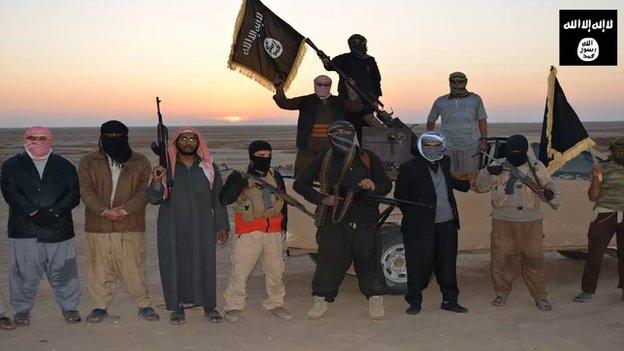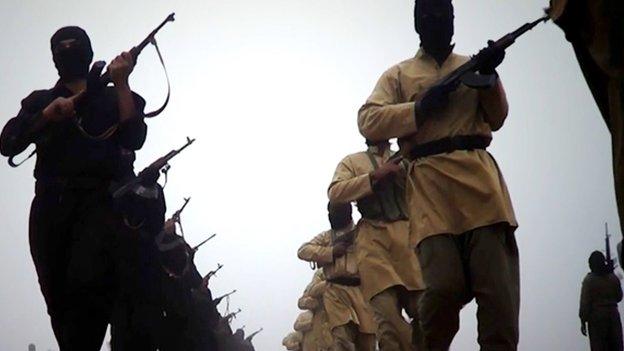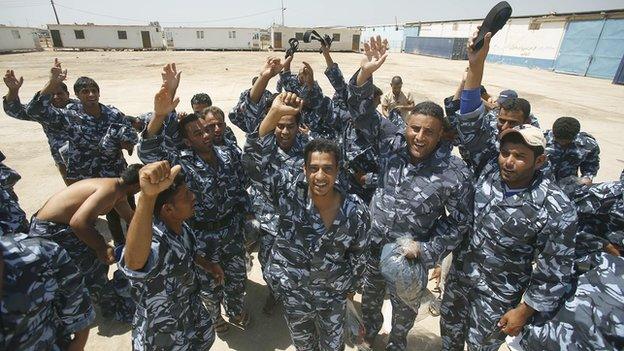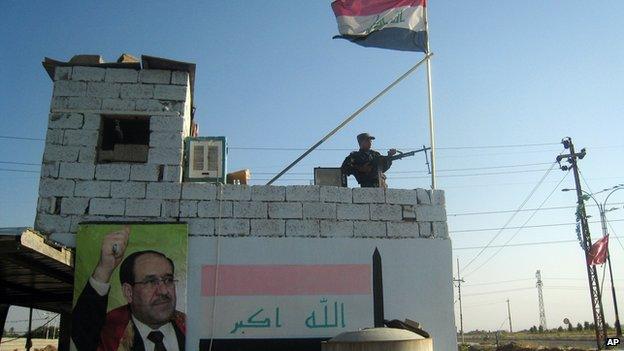Iraq crisis: How extreme are the fighters in Isis?
- Published

As Iraq has spiralled into violence and instability following a lightning-fast advance by the forces of the Islamic State of Iraq and the Levant (Isis), questions have arisen as to who exactly comprises this group which has posed the most serious threat to Iraq since US and coalition forces removed the dictator Saddam Hussein in 2003.
It is well documented now that Isis is comprised of individuals who have successfully merged religion, politics, and military expertise to form a potent force that has swept away fleeing Iraqi soldiers, and executed those who are foolish enough to stay behind.
These methods, in combination with Isis' implementation of Sharia (Islamic law) including bizarre acts such as cutting electricity to prevent people from watching television, have given the group a fearsome reputation.
Isis as a vehicle
Furthermore, Isis has inspired extremists of all stripes to join its operations in Syria and Iraq through a social media and mass propaganda campaign that hints at its jihadist goals.
But the extent to which the movement actually contains hardline committed jihadists is extremely difficult to ascertain. It is fair to say, however, that the true size of the jihadist element in the Isis operations in Iraq is far smaller than many suppose.
Indeed, as in Syria, it is often the case that many individuals in extremist movements use them as a vehicle for their own interests, adopting the garb and mannerism of a committed Islamic radical as a pathway to greater political goals.
The case of Iraq is no different. Joining the jihad are an amorphous bloc of different players, who have come together in an alliance under the banner of Isis.

Many members of Isis have returned from the war in Syria to join the battle for key Iraqi towns and cities
Whilst the instability in Iraq has connections to the Syrian conflict next door, and many individuals who fought for Isis in Syria are now present in Iraq, the Iraqi insurgency is more acutely focused on solving the problems of Iraq's fractured polity than it is the goals of more radical Islamic groups.
In a recent interview with the Daily Telegraph, external, member of the Batta tribe and leader of the Islamic Army of Iraq Sheikh Ahmad al Dabash stated: "All the Sunni tribes have come out against (Iraqi Prime Minister Nouri) Maliki.
"There are parts of the military, Baathists from the time of Saddam Hussein, clerics, everyone (who) came out for the oppression that we have been suffering," he added.
Widespread disaffection
To dismiss what is happening in Iraq as the product of the maniacal whims of a few radical fanatics is to ignore the very real social inequality that exists in Iraq.
Travelling around the country in recent days, I have been shocked at the levels of deprivation that some of Iraq's citizens have endured.
The grouping of fighters that has swept through Iraq to within 60km (40 miles) of the capital is not a nihilistic jihadist group hell bent on the establishment of an Islamic caliphate.
It is a more general uprising by large groupings of disaffected communities throughout north-western Iraq and a product of years of social exclusion, poor governance and corruption by the Iraqi government.

ISIS militants have consistently out-performed more established military forces in Iraq
On the military front, the key giveaway is the relatively strong performance of Isis militants against more established military forces.
Officials I have spoken to in the Kurdish Peshmerga forces have indicated that the level of training is high and that their own forces have at times struggled to hold key positions around the city of Kirkuk.
"For the most part we've been able to hold our positions, but it hasn't been easy. They [Isis] are well armed and well trained," one Kurdish security official told me on Tuesday, external.
Tentative alliance
Such performances are consistent with the assertion that key former Baathist military officers are coordinating Isis military operations, which was confirmed in my conversations with security officials in Kirkuk on Wednesday.
It is a strange alliance - the goals of secular pro-Saddam Baathists and radical Islamists would appear antithetical - and ultimately it may prove to be the movement's undoing.

Individuals fighting for Isis are said to be disillusioned by the exclusionist policies of Iraqi PM Nouri al-Maliki
The hope in Iraqi government quarters is that before long, when the Iraq army - along with 300 US trainers and Iranian-backed militias - begins to stem the tide of the Isis advance, the insurgents' morale will begin to fall and the cracks among its diverse membership will begin to appear.
For now, however, the alliance holds, and as Isis moves towards Baghdad, the fighting will intensify as Iraq's embattled government launches a fight back to stem the advance.
In the long run, however, if Baghdad cannot understand the need for political reform is as important as enforcing security then Iraq's problems could last a very long time.
Michael Stephens is the Deputy Director of RUSI Qatar currently blogging from Iraq and Iraqi Kurdistan in RUSI The Iraq Crisis: Dispatch from the North, external